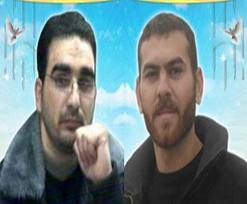A Zionist military court on Monday refused an appeal by long-term hunger-strikers Thaer Halahla and Bilal Diab to end their detention without charge
 A Zionist military court on Monday refused an appeal by long-term hunger-strikers Thaer Halahla and Bilal Diab to end their detention without charge, prisoners groups said.
A Zionist military court on Monday refused an appeal by long-term hunger-strikers Thaer Halahla and Bilal Diab to end their detention without charge, prisoners groups said.
Muhjat al-Quds society for the defense of prisoners said Ofer military court rejected the appeal against the prisoners’ administrative detention, on the 69th day of their hunger-strike.
Lawyer Jamil Khatib will now take their petitions to ‘Israel's Supreme Court’. The rulings show the negotiations to end the prisoners' hunger strike have failed, as they refused the Zionist suggestion to deport them to Gaza, Addameer Director Sahar Francis told media sources.
Negotiations are more difficult now that over a thousand prisoners have joined the hunger strike, as the Zionist authorities say they refuse to encourage others by agreeing not to renew the hunger-strikers’ administrative detention, Khatib said.
Diab, from Jenin, has been held without charge since August 2011. In February, the Zionist authorities extended the 27-year-old's sentence for a further six months without a trial.
 Halahla, from Hebron, was detained in July 2010. The 33-year-old's administrative detention order has been renewed several times, most recently on March 5 for another six months.
Halahla, from Hebron, was detained in July 2010. The 33-year-old's administrative detention order has been renewed several times, most recently on March 5 for another six months.
A wave of hunger strikes has drawn attention to the Zionist decades-long use of administrative detention, under which over 300 Palestinians are currently held without charge.
The Israeli occupation authority said it refused to disclose accusations or evidence to lawyers or detainees due to security concerns.
The Physicians for Human Rights-Israel (PHR) group slammed the court ruling.
 "The court's decision is a death sentence for both of them," PHR spokeswoman Amani Daif told AFP.
"The court's decision is a death sentence for both of them," PHR spokeswoman Amani Daif told AFP.
"Their lives are in danger and their families are still banned from seeing them," she said. "They could die any moment now."
Meanwhile, a Zionist official confirmed progress in the case of a mass hunger strike being observed by more than a third of the Palestinian prisoners being held by Israel.
As Diab and Halahla entered day 69 of their hunger strike, they were joined by another 1,200 detainees who began refusing food on April 17 in a bid to demand better conditions.
That number has now grown to "approximately 1,600 prisoners on hunger strike," ‘Israel Prisons Service (IPS)’ spokeswoman Sivan Weizman told AFP on Monday.
Among their demands are increased access to lawyers, family visits, and an end to both solitary confinement and administrative detention.
